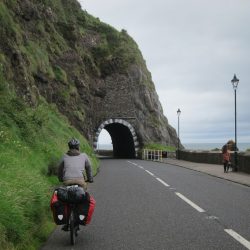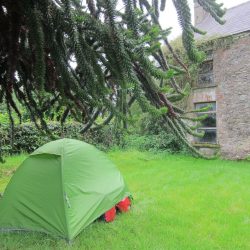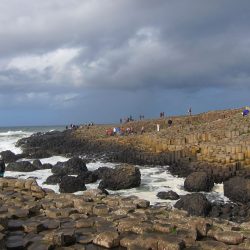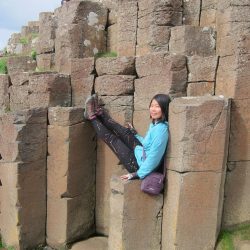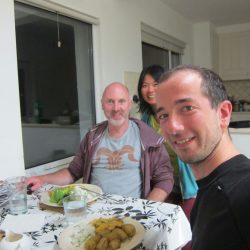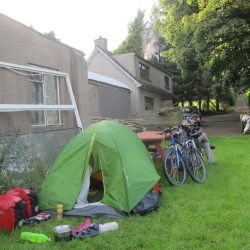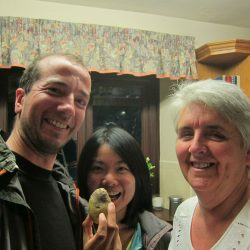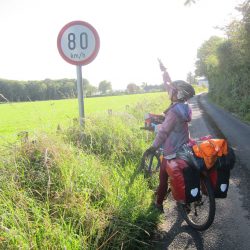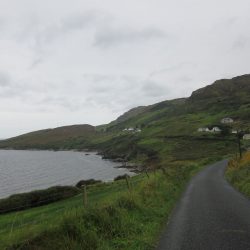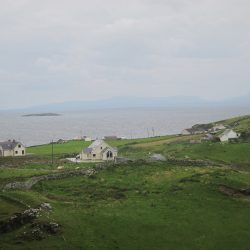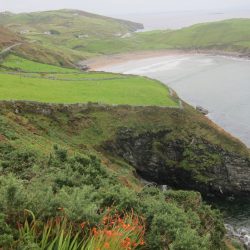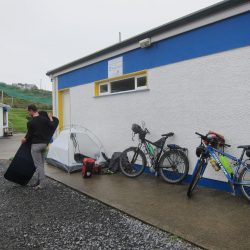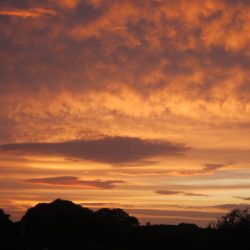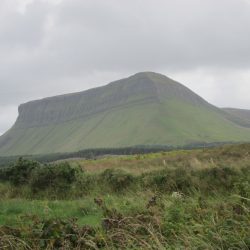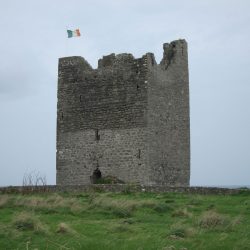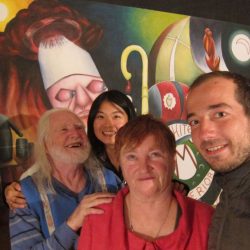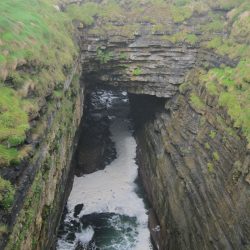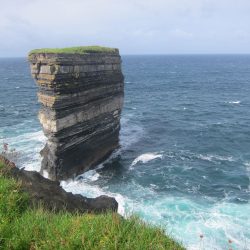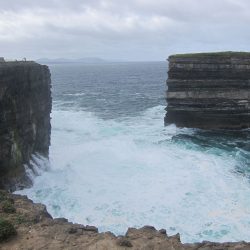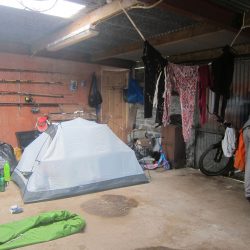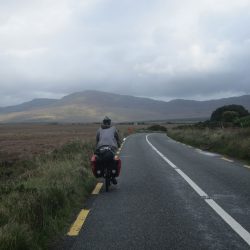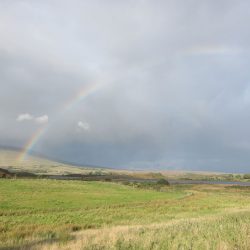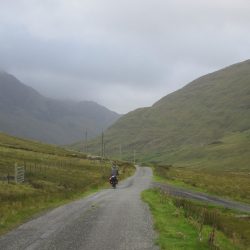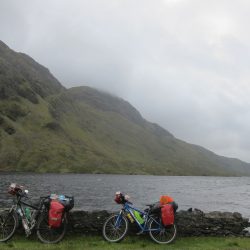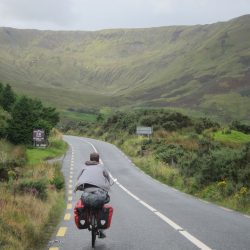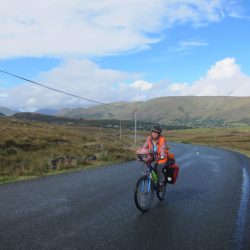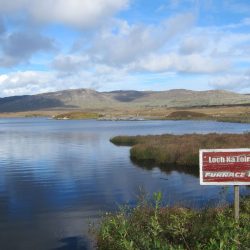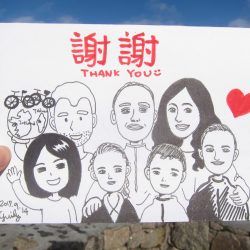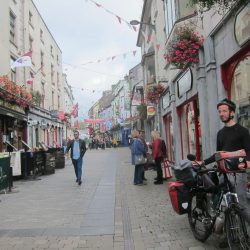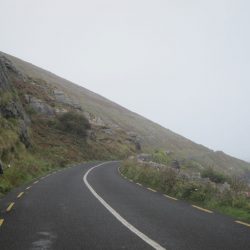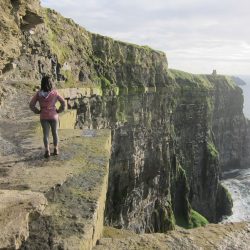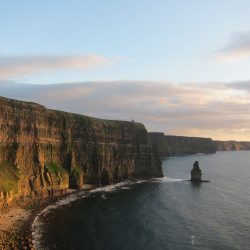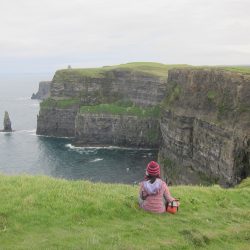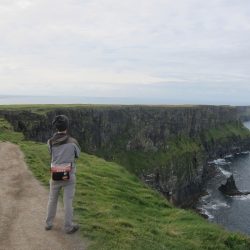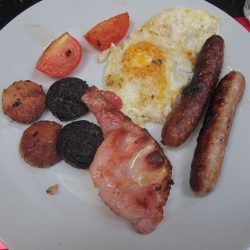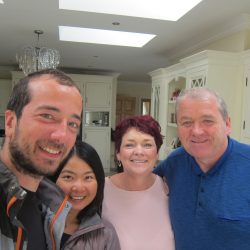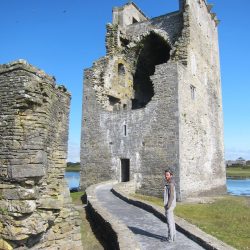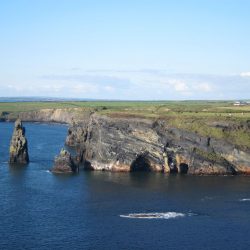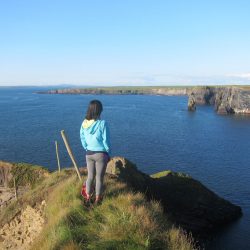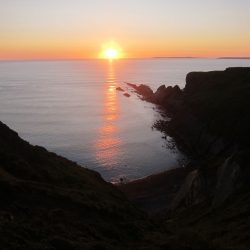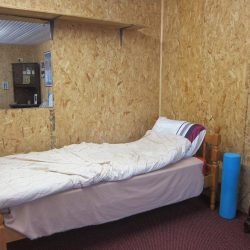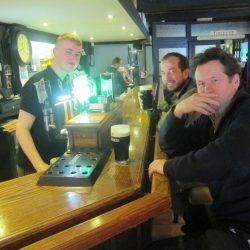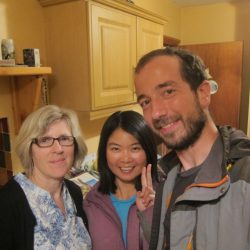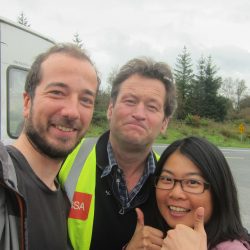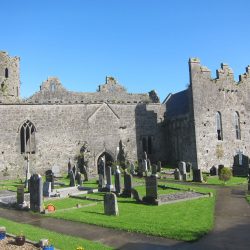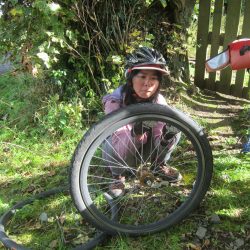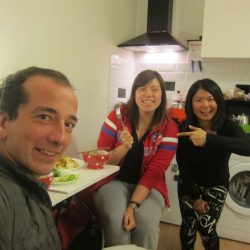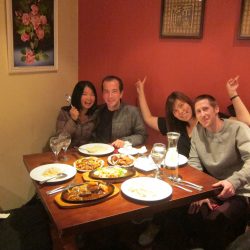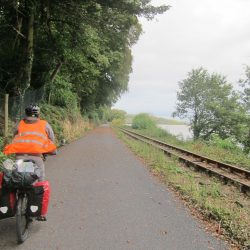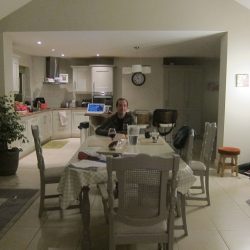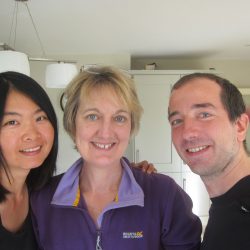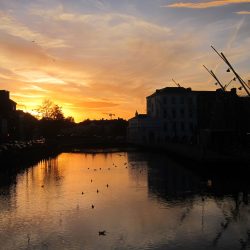The Emerald Isle… We heard many tales about its natural beauty and dramatic coastline, and furthermore recently many English and Scottish told us tales about the very hospitable nature of the people here. This turned out to be true, and I think we found one serious contender to Iran in that regard. What we also found though was a serious contender for worst weather on the planet!
The northern territorial anomaly
It was late as we came on shore in Larne, about 10 pm. Our glorious plan was to sleep in the ferry terminal, which worked out just fine. Noone bothered us as we rolled out our sleeping bags on the padded benches and we even found places to charge our phones. From here, we were able to go straight into the scenery as we could follow the coast road. Wild camping was not allowed again as compared to Scotland, but it was relatively easy, as we found multiple abandoned buildings on the first day already.
The famous Giant’s Causeway was our first attraction on this coast, and it was super touristy already. Sneakily, there was a sign with big letters for entrance prices, but only in the small print below it was clarified that these prices were for the use of the Information Center facilities. Access to the rocks was free. So we walked around the center and to the rocks. Which were impressive, even with the huge number of tourists walking around, although a bit smaller than I imagined.
- Coastal highway
- Camping at an abandoned house
- Giant’s causeway
- Hexagonal rocks
Our host later that evening mentioned that before the 2000’s, we would have had the place to ourselves, as tourists were way too afraid to come to Northern Ireland. We talked way more, and it’s a truly fascinating and incredibly confusing situation that Northern Ireland finds itself in. As Ireland voted for its independence from the UK in the 1920s, this part chose to remain in the Kingdom. Internal violence up to full scale terrorism in which thousands died plagued the territory for many years, for which the British really have to take most of the blame. The Good Friday Agreement in 1998 surprisingly ended most of the violence, and left the area as a unique, mostly autonomous region. Politically it’s part of the UK, but its residents can choose between using British or Irish or both nationalities. The Republic of Ireland also has some say whenever the foreign policy of Northern Ireland is involved.
The trenches between those who call themselves Irish (mostly Catholics) and British (mostly Protestants) still run deep however. Our Irish host would say that no British person would invite us like him, yet the same evening after cycling a bit further we asked to camp at a countryside house and were later invited for dinner by a lovely British lady, who couldn’t imagine that we were invited by an Irish person the night before. It wasn’t a new phenomenon to us. Multiple times in our journey people warned us of the folks in the next region or country, saying that they’re no good. This kind of thing never turned out to be true and reminds me that hate and dislike which humans have for each other are almost always stirred by the politics, the religion or the media and not by personal interactions…
- Irish host and…
- … camping with a…
- … British host
- Crossing the border
Regrettable Decisions
With our GBP running out and our desire to actually visit a new country, we made our way through Derry, a beautiful city, and to the border with the Republic. Which was again, weird. Nothing but a speed limit sign would signify our arrival into a new country. Also part of the Good Friday Agreement was the removal of any kind of land border as we could see here. It also wouldn’t make sense to put a “Welcome to Ireland” sign there, as we were already in Ireland. But the Republic uses kilometers while the UK uses miles, so announcing the new speed limit made sense. Shortly after we asked locals to camp and, just like before, we were shown to a flat spot in the garden – the hospitality continued.
I organized a warmshowers host for the next night in Donegal, which was a misnomer because their warm shower was broken (they already stated so on their profile). Here, I got a confidence loss in planning: As I revealed the plan to our host to cycle south from Donegal, he asked me why we are skipping the best part of Ireland. I simply hadn’t done enough research, saw the incredibly jagged coastline of County Donegal and decided to skip it by the main highway from Derry. Our host went as far as saying “Your whole trip has been building up to this, and now you take a shortcut to skip the best bit.” I lay in bed questioning myself and had a think-over with Yuily. We could still cycle out to the Slieve League cliffs to the west, camp somewhere and then return to Donegal to stay with John again. At least then we wouldn’t regret anything.
We left a large part of our luggage at Johns place, to the point that I was the only one with panniers, Yuily being almost completely unloaded. It very much affected our speeds, as she was now faster than me, but due to my male nature I still tried to keep up, so we made kilometers very quickly. This being Ireland though, it soon started to rain. We went to a sports field to seek shelter where a Gaelic Football match was going on. This being Ireland, soon we found ourselves invited to coffee, tea and snacks. Amazing hospitality. We continued, but didn’t get much further before more rain and darkness came and we camped.
All the forecasts predicted good weather for the next day, but this was Ireland. A continuous spray rain, soaking everything within seconds, had us stay in the tent until afternoon. By then we pretty much decided to head back to Donegal, as we wouldn’t see anything of the cliffs anyway. It did clear up a little bit momentarily and we even tried to hitchhike to the cliffs, but a driver who stopped assured us again that we wouldn’t see anything. We were disappointed, but didn’t feel regret. At least we tried.
- Donegal coast
- In the rain
- Very green
- Camping in the rain
Wild beauty
From Donegal on we closely followed the coastline, trying to learn from my mistake of taking shortcuts. After taking a rest/rain day with a wonderful host in Ballina, we finally got to see one of the best cliffs up close: Downpatrick Head! It was nothing but awesome, even though a couple of heavy rain showers were raging that day. Luckily, Irish hospitality was in for us again as a farmer had no objections to our request to let us camp in the garage. He was worried about us being uncomfortable, but we just told him that being sheltered from the heavy rain is the only comfort we need!
- Exploding sunset
- Mt. Benbulbin
- Easky tower
- Host in Ballina
- Downpatrick head
- Downpatrick head
- Downpatrick head
- Farmer’s shed
Ireland was getting more remote from here on as we kept cycling through wild areas of great natural beauty. The mountains in the west of Ireland are some of the oldest in the world, having been spared of the glacial cover in the ice age due to the Gulf Stream. They were very impressive. Frequently we had to dive for shelter as we saw some heavy rain showers approaching fast. Sometimes they came so fast and heavy that we had no choice but to stop on the side of the road, holding our rainjackets above our heads and wait for it to pass. Two heavy stroms hit the island as well, which we were luckily able to hide out in the houses of generous hosts in Newport and Leenaun. Ireland gets called “The Emerald Isle” because it is so green. But places with so much green nature are only so green because it rains a lot!
- Where are the clouds going?
- Rainbow
- Into the rain
- Doo Lough
We were now entering the biggest Gaeltacht of Ireland, Connemara. The Gaeltachts are areas of Ireland with an Irish speaking majority. That night we were spontaneously invited by a family after we asked for camping in their garden and quickly noticed that they were speaking nothing but Irish to each other. We had an interesting talk with them. Irish, belonging to the Celtic language family, was the only language spoken on the island for most of its history, only in the last two centuries it was gradually replaced by English. Apart from English colonisation, a big reason for this was the Catholic Church, which most of the very religious population follows. The Irish language was being supported again after independence, becoming a mandatory subject in schools, but the damage was done and the number of speakers continues to decline today as English is dominant.
Only in the most remote corners of the island the Irish language is now being spoken on a day to day basis. These areas were just too worthless for the English and the Catholic Church to control as they contained little farmland and resources with a population very scattered and poor. Today, people from these Gaeltachts are much more wealthy: They can score excellent jobs as they are sought all over the country as teachers, translators and service staff due to their language.
- Lush
- Cycling after rain
- Gaeltracht
- Go raibh maith agat!
Irish hospitality with another separation
Two days later we arrived at the world-famous Cliffs of Moher, where Ireland just rises 200m right out of the sea. Even though the area was super touristy, we really enjoyed hiking around and finding great photo spots. We headed to Kilrush, where a lovely couple let us spend the night in a replica of an old house after our camping request, gave us drinks and a pizza and invited us for breakfast the next morning. Lovely Irish hospitality at its best.
- Galway
- Towards the cliffs
- Cliffs of Moher
- Cliffs of Moher
- Cliffs of Moher
- Cliffs of Moher
- Irish breakfast
- Thank you spontaneous hosts!
A short ferry ride south saved us 150 km of cycling as we had some fantastic weather and spent it with a great Couchsurfing host in Ballybunion, who interestingly had a couple of awesome cliffs right behind his house. From here we were preparing for our second separation so far after China: Usually my German friends meet at a convention called Connichi in September. Two months back, I was considering to go and brought up the idea to Yuily, who was ok with it and told me to go for it. So I booked a flight from Kerry Airport, near Tralee, which was coming up now. Her wish for the week I was gone was to cycle around the Dingle peninsula and the Ring of Kerry. I really really appreciate being with Yuily, as even though she said she will miss me, she appeared totally strong and fearless and even wanted to go on this small solo cycling trip instead of staying put with a host! Things like this make me absolutely love her.
- Carrigafoyle Castle
- Small cliffs…
- … near our host’s home
- Sunset
We were aiming to find a place to camp in near Tralee, but unfortunately got rejected a few times. After getting rejected at a sports court, a worker from there called his wife and arranged for us to camp in his garden. Luckily we found a roofed shed there where we set up camp, which was good, as it rained buckets the next morning. My original plan was to cycle to the airport from here, and even though only 20 km away, the rain was going to make it dreadful. Paul, our host, came to us in the morning and straight away said “You should leave your bike here, I can give you a ride” He even offered Yuily to stay another night, this time inside the garden house, as the rain wasn’t going to stop. What a legend – saved by Irish hospitality again. Me and Paul agreed to have a few beers once I return from Germany.
And so, after a great time with some friends back in Germany, a week later I returned to Tralee and had my promised beer with Paul. Yuily was already there the night before due to bad weather, but she had an enjoyable cycle. We stayed another night before leaving and really cannot thank Paul and his family enough for their fantastic hospitality.
- Great luxury in the rain
- Having a beer
- Thank you!
- Paul
Straight across and back
Over the next three days we then cycled straight across Ireland to the town of Kilkenny. The reason was a Taiwanese friend of Yuily who settled there with her Irish husband. We had a great time with them and it was interesting to see their lives, and great for Yuily to be able to speak Mandarin again.
- Dominican Abbey
- Yuily’s first puncture in a year
- Thank you!
- Double date dinner
We also finally booked the ferry to France. It would be leaving from Cork, giving our route around Ireland a strange shape, but giving us the opportunity to see Ireland’s second biggest city. On the way, we were able to jump on the Waterford Greenway, an old train line recently turned cycle track, and receive yet more fantastic Irish hospitality:
After setting up camp in an empty field, the owners came and told us to leave. We packed everything and went to look somewhere else, being pretty disappointed, but I said I wouldn’t take down the tent again, so we better ask for permission this time. We started knocking doors, and after a few rejections a lovely woman took us in, gave us food and a room to sleep in. In the morning before leaving then she gave us EUR20 and told us to go eat something nice in Cork (our usual story about how we spend EUR3 per day must’ve worried her).
- Waterford greenway
- Luxury
- Thank you!
- Cork sunset
Said and done, our host in Cork was going to a Chinese restaurant that evening and asked if we would like to come along. Normally we have to reject such things because of our budget, but this time we were able to thanks to our previous host’s generousity. It’s what we will remember from this beautiful country: its amazingly hospitable people.
Previous: Scotland
